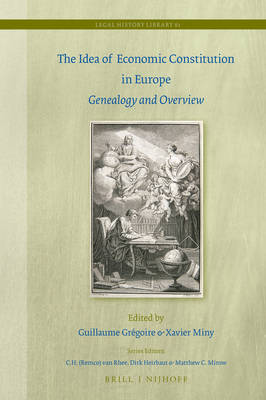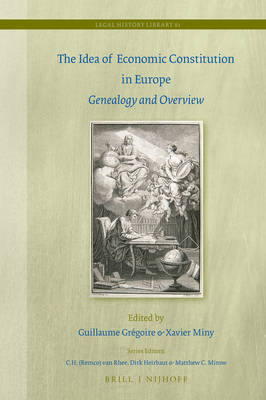
Je cadeautjes zeker op tijd in huis hebben voor de feestdagen? Kom langs in onze winkels en vind het perfecte geschenk!
- Afhalen na 1 uur in een winkel met voorraad
- Gratis thuislevering in België vanaf € 30
- Ruim aanbod met 7 miljoen producten
Je cadeautjes zeker op tijd in huis hebben voor de feestdagen? Kom langs in onze winkels en vind het perfecte geschenk!
- Afhalen na 1 uur in een winkel met voorraad
- Gratis thuislevering in België vanaf € 30
- Ruim aanbod met 7 miljoen producten
Zoeken
The Idea of Economic Constitution in Europe
Genealogy and Overview
€ 325,95
+ 651 punten
Omschrijving
Behind the controversies that have marked the history of the idea of Economic Constitution emerges the highly political issue of the room for manoeuvre left to public authorities in the economic sphere. The notion thus encapsulates a fundamental tension: between democracy and rule of law, which model of legal ordering of the economy should prevail?
From physiocrats to neo-liberals, from the Weimar Republic to European integration, from national constitutions to Global Governance, this collective book invites us to explore the genealogy of the controversial concept of Economic Constitution. The result of this interdisciplinary dialogue is a comprehensive reflection on the legal and political issues at stake in the current constitutionalization of the market order in Europe.
Contributors are: Philippe Steiner, Guillaume Grégoire, Hugues Rabault, Peter C. Caldwell, Thomas Biebricher, Werner Bonefeld, Serge Audier, Vincent Valentin, Pieter van Cleynenbreugel, Xavier Miny, Frédéric Marty, Claire Mongouachon, Hans-Wolfgang Micklitz, Francesco Martucci, Michael Wilkinson, Hjalte Lokdam, Susanna Maria Cafaro, Peter Lindseth, Cristina Fasone, Pierre Nihoul, François Colly, Peter-Christian Müller-Graff, Tony Prosser, Damien Piron, Mahmoud Mohamed Salah, Stephen Gill, Thibault Biscahie, Sebastien Adalid, and Christian Joerges.
Derrière les controverses qui jalonnent l'histoire de l'idée de Constitution économique émerge la question éminemment politique de la marge de manoeuvre laissée aux autorités publiques dans la sphère économique. La notion cristallise ainsi une tension fondamentale: entre démocratie et État de droit, quel doit être modèle d'organisation et d'ordonnancement juridique de l'économie?
Des physiocrates aux néolibéraux, de la République de Weimar à l'intégration européenne, des constitutions nationales à la Global Governance, cet ouvrage collectif nous invite dès lors à explorer la généalogie du concept polémique de Constitution économique. Les auteurs ouvrent alors, à travers un dialogue interdisciplinaire constant, une réflexion globale autour des enjeux juridiques et politiques du processus actuel de constitutionnalisation de l'ordre de marché en Europe.
From physiocrats to neo-liberals, from the Weimar Republic to European integration, from national constitutions to Global Governance, this collective book invites us to explore the genealogy of the controversial concept of Economic Constitution. The result of this interdisciplinary dialogue is a comprehensive reflection on the legal and political issues at stake in the current constitutionalization of the market order in Europe.
Contributors are: Philippe Steiner, Guillaume Grégoire, Hugues Rabault, Peter C. Caldwell, Thomas Biebricher, Werner Bonefeld, Serge Audier, Vincent Valentin, Pieter van Cleynenbreugel, Xavier Miny, Frédéric Marty, Claire Mongouachon, Hans-Wolfgang Micklitz, Francesco Martucci, Michael Wilkinson, Hjalte Lokdam, Susanna Maria Cafaro, Peter Lindseth, Cristina Fasone, Pierre Nihoul, François Colly, Peter-Christian Müller-Graff, Tony Prosser, Damien Piron, Mahmoud Mohamed Salah, Stephen Gill, Thibault Biscahie, Sebastien Adalid, and Christian Joerges.
Derrière les controverses qui jalonnent l'histoire de l'idée de Constitution économique émerge la question éminemment politique de la marge de manoeuvre laissée aux autorités publiques dans la sphère économique. La notion cristallise ainsi une tension fondamentale: entre démocratie et État de droit, quel doit être modèle d'organisation et d'ordonnancement juridique de l'économie?
Des physiocrates aux néolibéraux, de la République de Weimar à l'intégration européenne, des constitutions nationales à la Global Governance, cet ouvrage collectif nous invite dès lors à explorer la généalogie du concept polémique de Constitution économique. Les auteurs ouvrent alors, à travers un dialogue interdisciplinaire constant, une réflexion globale autour des enjeux juridiques et politiques du processus actuel de constitutionnalisation de l'ordre de marché en Europe.
Specificaties
Betrokkenen
- Uitgeverij:
Inhoud
- Aantal bladzijden:
- 848
- Taal:
- Engels
- Reeks:
- Reeksnummer:
- nr. 61
Eigenschappen
- Productcode (EAN):
- 9789004519336
- Verschijningsdatum:
- 10/06/2022
- Uitvoering:
- Hardcover
- Formaat:
- Genaaid
- Afmetingen:
- 155 mm x 234 mm
- Gewicht:
- 1342 g

Alleen bij Standaard Boekhandel
+ 651 punten op je klantenkaart van Standaard Boekhandel
Beoordelingen
We publiceren alleen reviews die voldoen aan de voorwaarden voor reviews. Bekijk onze voorwaarden voor reviews.








